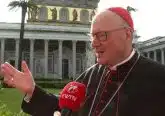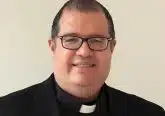In budget debate, candidates offer wide contrast in spending priorities
September 24, 2012
Catholic News Service
WASHINGTON —Determining what to spend taxpayer money on is being scrutinized this presidential election cycle perhaps more closely than in elections past even as the overriding concerns are jobs and building a robust economy.

Is government too big or does government contribute to the common good? Should taxes be raised for the highest wage earners or should there be another round of tax cuts for those at the top? To reduce deficit spending, should cuts come in entitlement programs such as Medicaid, Medicare and food stamps or do such programs always deserve support?
In the end, as Matthew Shadle, associate professor of moral theology at Loras College in Dubuque, Iowa, told Catholic News Service, “It’s not so much a matter of budget. It a matter of how we think of the government … to meet human needs.”
While questions on the government’s role have been debated throughout the past 40 years of presidential elections, this time around the divide between Democratic and Republican views is perhaps as wide as ever and is illustrated in their approach to federal spending priorities.
Republicans Mitt Romney and Rep. Paul Ryan favor a reduced role for government so that personal initiative is not stifled and individuals can assume more responsibility in their lives. That strong sense of individualism is reflected across the Republican budget plan, especially in calls for sizeable cuts in discretionary spending and entitlement programs and the restructuring of Medicaid and Medicare so that only the neediest people receive government assistance.
Romney has endorsed much of the plan introduced by Ryan, a Catholic from Wisconsin, whose 2013 budget adopted by the House of Representatives in March reflects a belief in smaller government and that too many people depend on federal programs.
In addition to reduced spending, the GOP platform calls for simplifying the tax code by closing loopholes, eliminating certain tax credits and lowering individual and corporate tax rates. Under the plan the highest tax rates would be set at 25 percent, down from 35 percent.
Romney and Ryan maintain that such steps are the best way to address the country’s $15 trillion debt.
President Barack Obama and Vice President Joe Biden, the Democratic ticket, see a bigger role for government and call for government spending on things such as road construction, education and environmental protection to remain largely unchanged. They also want to largely preserve entitlement programs, especially as the economy slowly recovers from a deep recession.
Additionally, they want to see the 2001 and 2003 tax cuts expire for the highest income earners as one way to offset spending and begin reducing government debt.
Despite their views, both tickets have revealed few specifics.
Allocating limited resources is not easy, said Bishop Stephen E. Blaire of Stockton, Calif., chairman of the U.S. Conference of Catholic Bishops’ Committee on Domestic Justice and Human Development. Nevertheless, he said, budgets must be judged by basic moral principles.
“I always find it a matter of balance,” he told Catholic News Service. “I feel you’re constantly trying to achieve a balance and that’s not easy. Different people are going to come to different perspectives. I think the question is you have to make all these choices, so you’ve got to be guided by (moral) principles.”
Bishop Blaire offered three questions for people of faith to consider:
• How does a budget promote the life and dignity of the human person?
• How does a budget follow the principles of Matthew 25 in caring for the “least of these”?
• How does it address the issues of the moment, such as unemployment and hunger?
“No matter what political persuasion you are, you still have to ask these questions,” Bishop Blaire said. “It’s not just a matter of saying who has the better approach. It’s raising the issues with the person you support.”
By examining the budgets of the major candidates, Vincent J. Miller, professor of religious studies at the University of Dayton in Ohio, told CNS the candidates’ motivations become clearer.
“If you read the (Republican) budget plan there are two concerns: (Ryan) emphasizes the fiscal crisis. But the other one that is always there is dependency is the danger. His budget in fact cuts the safety net first, but without stating specifics on how it will cut the benefit.”
In contrast, Miller explained, Obama “understands the government and its relation to the common good and that the government needs to do what the economy can’t do on its own.”
“There’s the notion there’s more to the common good than the economy and government has a role and responsibility there,” he added. “The Democrats’ desire for sacrifice from both sides with some cuts in benefits and programs and raising taxes.”
Father Robert A. Sirico, co-founder and president of the Acton Institute for the Study of Religion and Liberty, told CNS he did not think bigger was better. The more local the source of services and the less government is involved, the better, he said.
“The biggest obstacle is not a financial obstacle, but the way we think about a social commitment,” Father Sirico explained. “Many of these (social service) groups that have been calling for more government largess, to take on more as government contractors, is a paradox. A lot of these groups have created the environment that has caused the American people to shift in their attitudes about service to the poor so that we have begun to think of the government as the resource of first resort.”
Presentation Sister Richelle Friedman, director of public policy at the Coalition on Human Needs, said the massive changes proposed under the Republican budget would likely “erode” programs she said are vital to the poor and elderly.
“The truth of the matter in today’s economy the needs are too great to be met by communities and individuals,” she said.
“Society has to decide the direction it wants to go in,” she added. “This is clearly a stark choice.”
Shadle, the moral theologian, suggested that from whatever perspective a person comes, Catholic social teaching offers insight into the role of community in upholding human dignity and guidance on determining the best course of action for the country to follow.
Writing the Catholic Moral Theology blog Sept. 14, he said, the Compendium of the Social Doctrine of the Church explains that “God is seen as the origin of what exists.” Therefore, he reasoned, dependence — on each other and in community and its representatives in government or otherwise — is not something to be shunned outright.
“The political implications of the gracious acceptance of dependence do not easily fit into partisan categories,” he wrote. “We are called to be neither the self seeking control of its own destiny or the self demanding personal fulfillment from society. We are called beyond ourselves, to build a society in which every human life is received as a gift, in which families, communities and government work to provide the conditions for human flourishing and in which we give gratitude to God for our existence.”













